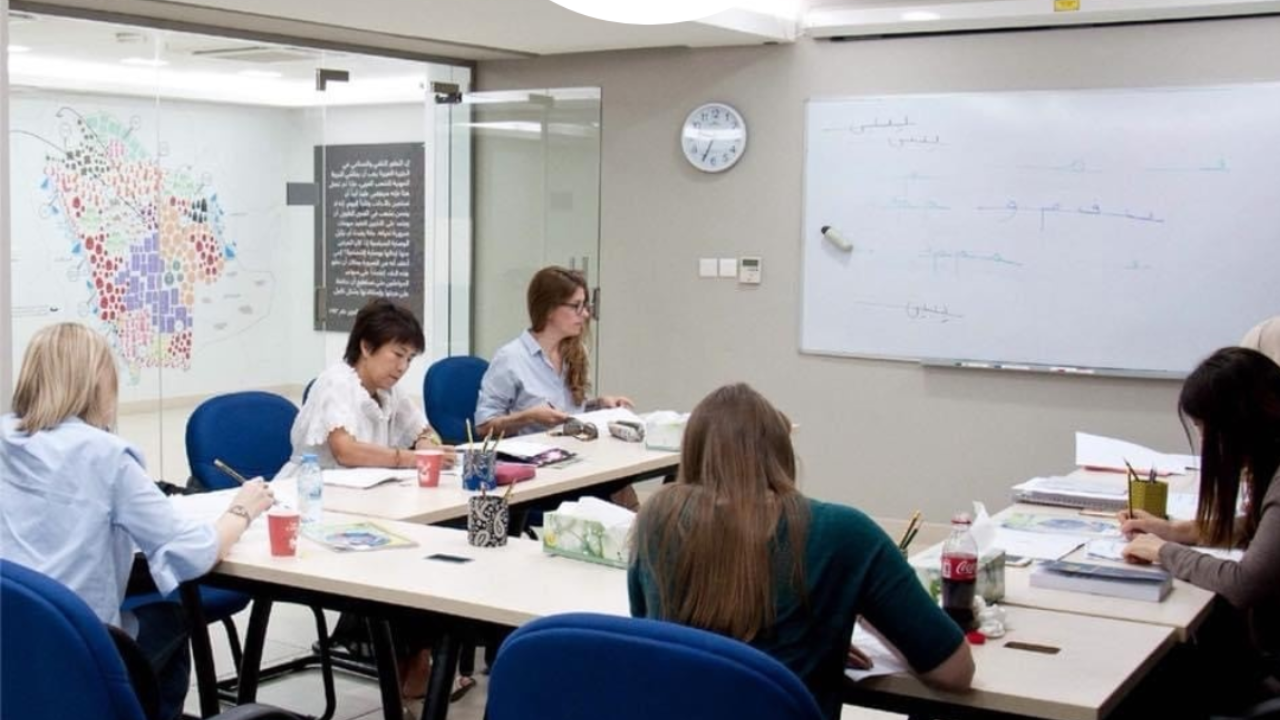A Blog Entry by Filip from Switzerland
Ahlan wasahlan
My name is Filip, I am 24 years old and an open-minded French teacher at a High School in Zurich, Switzerland. Saudi Arabia, especially my time in Jeddah, completely enchanted me. The city, combined with the Red Sea, the warm-hearted people, and the overall positive energy you feel every single day, all contributed to the fact that I returned to Switzerland with, among other emotions, a tearful eye.
The daily Arabic lessons at Qanaateer had a positive impact on me, both linguistically and socially. I began my Arabic journey remotely: Qanaateer offers an online course where you can already acquire basic knowledge in both written and spoken Arabic. During my trip from Riyadh via Al-‘Ula to Jeddah, I had already made some progress and arrived in Jeddah with a small backpack full of Arabic knowledge.
From the very first day, I felt incredibly comfortable at the language center. A major contribution to this atmosphere is made by Hadeel. Through her people-centered approach...
Finding the World in Jeddah: Cosmopolitanism and Hospitality on the Red Sea Coast

I have been in Jeddah only seven months, and my Google Maps list for the city is already 162 bookmarks long. The list is mostly comprised of restaurants, which is certainly illustrative of how eating delicious food is so crucial a habit and hobby for me. But it is also indicative of something larger than my narrow interests, something historical, worldmaking even. A list of the most ethnically diverse yet simultaneously very local food spots tells of a history and present where this medium-sized city on the Red Sea coast has served as a portal of entry for prophets, pilgrims, and traders across millennia. And in so being, Jeddah became a cosmopolitan outpost, a culinary melting pot, and the very definition of hospitality.
As the primary entryway to Makkah and Madinah, Jeddah exemplifies what historian Ulrike Freitag calls “Islamic cosmopolitanism.”[1] Muslims from all four corners of the earth have been visiting the holy cities for centuries. Many have settled in Jeddah and the broade...
Michelle's Experience Learning Abroad with Qanaateer
Hello!
My name is Michelle, I am 20 years old and I live in Spain, but I am originally from Germany. I’ve always liked traveling and studying languages and I was super interested in going to Saudi Arabia and thanks to Qanateer, I had a wonderful journey in Jeddah.
I had such a great experience and I especially have to thank Hadeel for that. The school is super well organized and focuses on every student and their level. I’ve learned a lot in the short time I was there, so I will continue online now, because I really enjoy studying with all the teachers of Qanateer. Among other things every teacher really cares about their students. If it’s about studying, about activities the school offers, what to do in the free time or how to arrive to the school and how to come back home. I appreciated this welcoming and safe feeling everybody gave me there.
So if you think to start your travel journey in Jeddah with Qanateer, I highly recommend it!
Places I’ve visited in Jeddah and liked a lot ...
Grammar & Vocabulary Insights

📚 Grammar & Vocabulary Insights: Building a Strong Foundation in Arabic
Mastering Arabic starts with understanding its unique grammar and rich vocabulary system. While Arabic can feel intimidating at first glance, it becomes much easier when you focus on the essentials—and understand how words are built and used.
Here’s a guide to help you gain clarity and confidence in Arabic grammar and vocabulary.
✅ 1. 10 Essential Verbs Every Arabic Learner Should Know
Verbs are the heartbeat of any sentence. Here are 10 high-frequency Arabic verbs that every beginner should learn:
-
كَتَبَ (kataba) – to write
-
قَرَأَ (qara’a) – to read
-
ذَهَبَ (dhahaba) – to go
-
جَاءَ (ja’a) – to come
-
أَكَلَ (akala) – to eat
-
شَرِبَ (shariba) – to drink
-
رَأَى (ra’ā) – to see
-
عَرَفَ (ʿarafa) – to know
-
أَحَبَّ (aḥabba) – to love
-
عَمِلَ (ʿamila) – to work
Start using these verbs in simple sentences like:
أنا أحب القهوة (I love coffee) or ذهبتُ إلى السوق (I went...
📝 Language Learning Tips: Mastering Arabic the Smart Way

Learning Arabic can be an exciting and rewarding journey, whether you're studying for travel, work, heritage, or personal growth. But it can also feel overwhelming—especially with the rich vocabulary, unique script, and variety of dialects. Don’t worry, though! We’ve gathered essential insights and practical tips to help you navigate your Arabic learning journey with more ease and confidence.
🌟 1. How to Learn Arabic Faster: 5 Proven Techniques
Learning a language quickly isn’t about rushing—it’s about learning smart. Here are five powerful strategies to boost your Arabic learning speed:
-
Set Specific Goals: Break your learning into small, manageable milestones—like mastering greetings, then common verbs, then constructing simple sentences.
-
Use Spaced Repetition Systems (SRS): Tools like Anki or Memrise help you remember vocabulary through proven memory techniques.
-
Focus on High-Frequency Words: Learn the most commonly used Arabic words first to gain immediate practic
...


